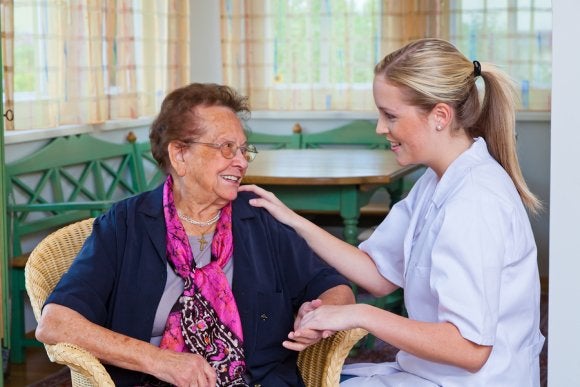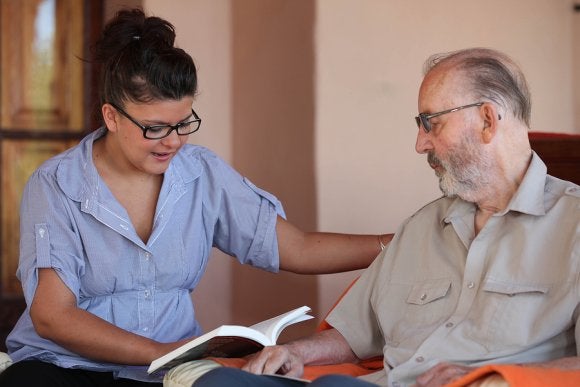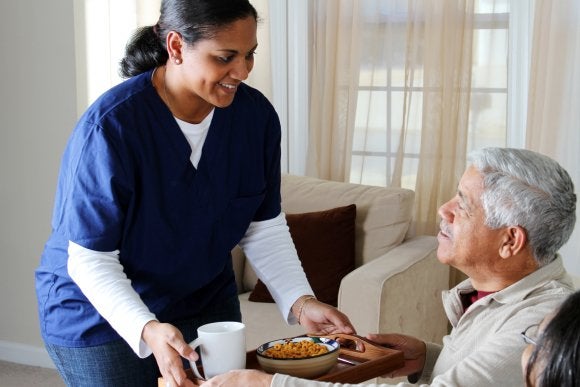-
A Look at Falls in Senior Citizens
A Look at Falls in Senior Citizens
Because seniors are often prone to falls, it’s important to regularly evaluate your loved one’s need for elderly care in Memphis . Seniors are at risk for a number of health conditions that can make them more prone to tripping, losing their balance, and falling, both in and out of the home. Here is a look at the causes, complications, and prevention of falls in senior citizens.

Common Causes of Falls
When caring for elders, it’s important to be aware of the common causes of falls. Seniors can develop muscle or spinal problems that make it difficult for them to keep their balance or walk. They can also develop vision problems, which make it hard for them to see obstacles in their paths. Low blood pressure and low blood sugar may cause dizziness upon standing, resulting in a fall. Senior citizens are also at a higher risk of dementia, foot problems, sensory problems, and poor reflexes, all of which may cause a fall.
Complications of Falls
A fall can cause serious complications for an elderly loved one, which is why it is so important to seek elderly care or senior assisted living services if you believe that your loved on is at risk of a fall. If your loved one has osteoporosis or a spinal condition, he can break or fracture bones easily even after a minor fall. He may also suffer from severe bruises, contusions, or head injuries that can increase his risk of infection or other motor problems. If your loved one lives alone without the support of a home health aide, a fall can prove to be catastrophic.
How to Prevent Falls
The best way to prevent falls is to hire a home health aide or in-home caregiver for your loved one. You should also ensure that pathways are clear of obstacles, and that the home has proper lighting. Carpeting, flooring, and stairways should be maintained so that they don’t cause accidents. If your loved one has health conditions that may cause a fall, he may need senior assisted living services.
-
Household Chore Support from In-Home Caregivers
If you or one of your loved-ones requires a little extra help with daily or weekly domestic tasks, long-term home care in Memphis may be a good solution for you. Here at Caring Companions , our kind and compassionate staff are trained to assist people of all ages to lead comfortable independent lives.
We offer a number of services for those who require assistance with household chores. Our staff can help keep your house clean. We can sweep, vacuum, and mop floors and carpets, dust, and keep kitchens and bathrooms in good condition. If you let us know your trash collection day, we will also take out the garbage. In addition, we can help with your laundry needs. We are happy to wash, dry, and fold clothes. We also provide ironing services on request.
Let us help you keep your home clean and tidy, so that you can live in a pleasant, appealing environment.

-
How to Fall-Proof Your Home
If you are caring for elders in Memphis , or are concerned about your own wellbeing at home, this video provides some important tips on how to ensure your home is a safe as possible. Around a third of seniors suffer a fall each year, many of them inside their own homes. c
The video suggests making the bathtub more accessible by creating a bathtub cut-out, to allow seniors to get in and out of the tub more easily. The presenter also recommends placing an additional booster seat onto the toilet, to add height. The seat can contain arm grips for extra security. The presenters advise removing door saddles and other obstacles which people could trip over. Watch the video for more advice on how to fall-proof your home.
-
How to Care for Your Aging Parents
How to Care for Your Aging Parents
As your parents age, you will be faced with making the difficult decision as to whether or not they need senior assisted living services near Memphis . Caring for elders can be complicated and time-consuming, particularly if you don’t have experience as a home health aide. Here are some helpful tips for providing in-home care for your aging parents.
Have an Honest Conversation with Your Parents
The first step in developing an in-home care plan for your parents is to have an honest conversation with them about your intentions. If necessary, you can enlist the services of a doctor, counselor, or other professional to help you have this conversation. During this conversation, you should voice your concerns about your parents’ safety, and discuss the possibility of hiring an in-home caregiver. It’s important to give your parents time to discuss their feelings. You should listen carefully and respond sympathetically to their thoughts.

Determine the Level of Elder Care That is Needed
Next, you must determine the level of elder care that your parents need. If they are capable of living independently, but require some assistance with daily tasks, you can hire an in-home caregiver. If your parents have medical issues that require monitoring, they might need at-home nursing care from a private duty nurse. If they are at risk of dementia or are already exhibiting early warning signs of the disease, they will need specialized dementia home care. Once you know what senior assisted living services they require, you can begin talking to home health care companies.
Evaluate Your In-Home Care Options
It is important to find a reputable home health agency that can provide the homecare assistance that your parents need. When evaluating different home health care companies, you must determine if they are qualified to provide the caregiver and assisted living services that are necessary to keep your parents happy and healthy. If your parents require home health care services like medication or medical equipment monitoring, you will need to find a caregiver agency that employs private duty nurses.
-
What to Expect from End of Life Care
What to Expect from End of Life Care
It is incredibly difficult and heart wrenching to learn that your loved one needs end of life care in Memphis . As you and your family begin investigating terminally ill caretaking services, you should consider seeking professional help and support from a counselor, therapist, or spiritual advisor. This person can help you and your loved one make the transition into assisted living and end of life caretaking services.
A home health agency can provide you and your family with an in-home caregiver who has experience in end of life care. This ensures that your loved one can remain in his home, surrounded by friends and family, rather than in hospice care or an assisted living facility.
A home health aide, private duty nurse, or in-home caregiver can provide your loved one with assistance with meal preparation, medication, medical equipment, light household chores, and grooming tasks. A private duty nurse can monitor his vital signs and administer medical care if necessary. Your loved one’s end of life caregiver will work closely with you and a hospice agency or medical provider to provide your loved one with the care and comfort that he needs.

-
Why Seniors Benefit from Having Companionship
As people age, they may become increasingly socially isolated. Children and other close relatives may have moved to a different part of the country. Many friends and colleagues from their own youth may have predeceased them. Decreased mobility or poor health may make it more difficult for seniors to stay mobile. Some may become increasingly restricted to their own homes. It is important to find ways to combat the dangers of isolation. Companionship is vital to maintaining good mental and physical health,at every age. Seek out caring companions near Memphis , who can help to provide company for older people, alleviating their loneliness.

Improved Physical and Mental Health
Stress is a major cause of illness for people of all ages. Being surrounded by a good social network has been shown to reduce stress. People who retain friendships and connections have been shown to enjoy better health in old age. Studies have also demonstrated that companionship can help keep us mentally alert in our senior years. Older people who remain socially active are less likely to develop Alzheimer’s, dementia, and other diseases associated with a decline in mental acuity. Sharing anecdotes can help to keep memories vivid. Shared humor can lift people’s spirits, and jokes can help keep seniors mentally sharp.
A Sense of Belonging
At all ages, people flourish when they feel a sense of belonging. Seniors, in particular, benefit from being part of a community of their peers. Daily social interactions can help give them a sense of purpose. Sensitive companions can provide empathy with their troubles. Affectionate touches, such as gentle hugs, can make people feel calmer and more content. When seniors are surrounded by companions, they feel more integrated into society. Discussions with others can help keep them in touch with the outside world. The company of others helps to keep us feeling wanted and needed, at all ages. It can be especially important for seniors, who can become isolated all too easily. Seek out life-enriching social relationships for you and your loved-ones for life.
-
Answering Questions Families Have About End-of-Life Care
If your loved-one has been diagnosed with a terminal illness, there may come a point at which you have to make the difficult decision to end his or her medical treatment. If he or she is suffering and there is no prospect of recovery, the time may come to end all medical interventions except palliative treatment, and seek end-of-life care in Memphis . At this point, the priority is to make sure that your loved-one spends his or her last days and weeks with as much dignity as possible.

Treatments and Therapies
There are number of medical and psychological treatments available to help make your loved-on comfortable during the final period of his or her life. Trained professionals can prescribe and administer pain medication. The loved-one may also need medications to alleviate other symptoms, such as nausea, digestive problems, or difficulty breathing. Treatments may be administered at home or in a hospital, depending on his or her needs and wishes. Spiritual and psychological support is also crucial. Counselors, together with spiritual leaders, if appropriate, and other skilled professionals can offer guidance and emotional support.
Advanced Directives
Most patients find it reassuring to talk about their wishes for end-of-life care well in advance. This allows them to make decisions calmly, while they are still in relatively good health and can think clearly. Their primary care physicians should discuss the available options clearly and frankly. Knowing that they have already made all the necessary arrangements offers many patients peace of mind. The loved-on can draw up an advanced care directive , designating a proxy decision-maker, and detailing his or her specific wishes with regard to care. This enables friends and relatives to know exactly what to do later, even if the patient is too incapacitated to be able to express his or her own needs or desires.
Emotional Support
If you are caring for someone in the final stages of a terminal illness, there are a few simple things you can do to help him or her come to terms with the situation. Talk to your loved-on about his or her life. Reminisce, share memories, recall achievements, even share jokes. Celebrate your shared past and look to the future by discussing the lives and prospects of his or her other family members. Don’t hesitate to seek professional support if you need it.
-
Should Your Senior Loved One Stay Home Unattended?
One of the most difficult decisions every family will face some day is how best to care for aging loved ones. Elderly care can often be a contentious topic for families, as seniors typically desire to stay at home, while their loved ones worry for their safety. Although seniors may be initially hesitant to acquiesce to elderly care, there is a solution that can meet everyone’s needs: in-home care. With in-home care, a caregiver helps your senior loved one stay independent in the familiar surroundings of home, providing as much care needed. Learn more about in-home care in this infographic from Caring Companions . We provide in-home care in Memphis and can help you find the right solution for your loved one’s need. Call us to discuss your concerns and find out which service may be right for you. Every family will contend with this choice some day, so please share this information.

-
What You Need to Know About Transition Care
After your loved one is discharged from the hospital or hospice care, you may need assistance from a home health aide serving Memphis . A professional private duty nurse or in-home caregiver can provide transition care services for your loved one that will help him recover and receive the necessary home health care that he needs. Before your loved one is released from the hospital, you should consult with a home health agency about coordinating transition care.
A home health aide can provide a variety of elder care services that will make sure that your loved one remains happy, healthy, and comfortable in his home. Your loved one’s in-home caregiver can offer assistance with personal care, including bathing, grooming, and dressing. The home health aide can also offer meal preparation services to ensure your loved one receives balanced, nutritious meals.
A home health aide will provide medication management services and make sure that your loved one takes his medication on time and in the correct dosage. He will also monitor medical equipment and vital signs. Additionally, an in-home caregiver can help with household chores and provide transportation to doctor’s appointments and social engagements.

-
Signs That Your Loved One May Need Home Care
It can be very difficult to make the decision to seek in-home care near Memphis for your elderly loved one. At a certain point, however, your loved one may not be able to take care of himself safely or effectively. Here is a look at some of the signs that your loved one may need home care.
 Inability to Regularly or Appropriately Groom or Feed Himself
Inability to Regularly or Appropriately Groom or Feed Himself One of the first signs that your loved one is unable to care for himself is that he exhibits a decline in personal hygiene. He may also be unable to prepare meals for himself, or may forget to eat. You may notice that he has lost weight, or looks tired and unhealthy. He may wear dirty or mismatched clothes, and have a strong body odor. A home health aide can assist your loved one with personal care and meal preparation to ensure he remains comfortable, happy, and healthy.
Household Chores and Bills Are Ignored
Another significant sign that you need the services of a home health agency is that your loved one’s household chores and bills are ignored. If you visit your loved one and there are dirty dishes piled in the sink, spoiled food in the refrigerator, animal feces in the house, laundry that has gone unwashed, and a stack of bills that haven’t been paid, these are signs that he is not living in a safe and comfortable environment. An in-home caregiver can perform routine household chores and will consult with you regarding bills your loved one receives so that you can make sure that they get paid.
Exhibits Mood Swings and Memory Loss
The primary symptoms of dementia and Alzheimer’s are progressively worsening memory loss, cognitive impairment, and behavioral changes or mood swings. Your loved one may lose interest in hobbies and activities that he previously enjoyed, or may exhibit signs of anxiety, depression, and exhaustion. He may forget important dates, appointments, or directions. Dementia home care allows your loved one to remain in a comfortable environment while receiving necessary elderly care.
